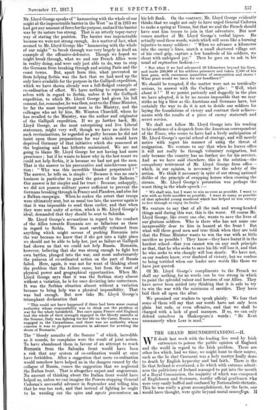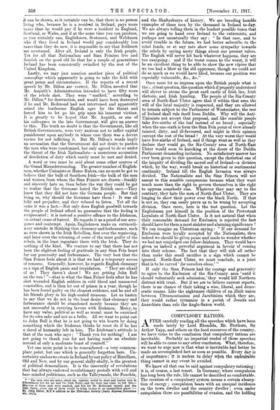THE GRAND MISUNDERSTANDING.—II.
WE dealt last week with the leading lies used by Irish extremists to poison the public opinion of England and the world in regard to the Irish problem. There are other lies which, had we time, we might hunt to their source, such as the lie that Casement was a holy martyr foully done to death by English hypocrisy and bad faith. There is the lie that Ireland is overtaxed, a lie which with extreme adroit- ness the politicians of Ireland managed to put into the mouth of a Royal Commission, the majority of which was composed of Englishmen and Scotsmen, worthy official gentlemen who were very easily baffled and confused by Nationalistic rhetoric. This lie was really a great accomplishment, for the facts, one would have, thought, were quite beyond moral camouflage.. II
it can be shown, as it certainly can be, that there is no person living who, because he is a resident in Ireland, pays more taxes than he would pay if he were a resident in England, Scotland, or Wales, and if at the same time you can produce, as you certainly can, Englishmen, Scotsmen, and Welshmen who if they lived in Ireland would pay considerably less taxes than they do now, it is impossible to say that Irishmen are overtaxed. After all, Ireland is only the Irish people. Yet for all that Nationalism and Sinn Feinism live and flourish on the good old lie that for a couple of generations Ireland has been consistently swindled by the rest of the United Kingdom.
Lastly, we may just mention another piece of political camouflage which apparently is going to take the field with great pomp and circumstance. If the reports of a recent speech by Mr. Dillon are correct, Mr. Dillon asserted that Mr. Asquith's Administration intended to have fifty more of the rebels shot. They were " marked," according to Mr. Dillon,* for destruction, and would have been destroyed if he and Mr. Redmond bad not intervened and apparently seized the loathsome English ogre by the throat and forced him to let go his grip upon his innocent victims. It is greatly to be hoped that Mr. Asquith, or one of his colleagues in the late Government, will give an answer to this. The truth no doubt is that the Government, like all British Governments, were very anxious not to inflict capital punishment upon anybody in whose case there was a decent excuse for not inflicting it. But Mr. Dillon's words imply an accusation that the Government did not desire to pardon the men who were condemned, but only agreed to do so under the threat of the Irish Nationalists—a monstrous accusation of dereliction of duty which surely must be met and denied.
A word or two must be said about some other sources of the Grand Misunderstanding. The greater number of English- men, whether Unionists or Home Rulers, can no more be got to believe that the bulk of Southern Irish—the bulk of the men and women from whom the Sinn Feiners are drawn—frankly and sincerely hate us, than before the war they could be got to realize that the Germans hated the British race.—They knew that they did not hate the German people. But that being so, why should the Germane hate them ? It was all folly and prejudice, and they refused to listen. Yet all the same it was a fact.—Not only does English goodwill towards the people of Ireland afford no guarantee that the feeling is reciprocated ; it ie instead a positive offence to the Irishman, an actual cause of hatred. He regards it as a proof of our arro- gance and contempt. Again, Englishmen make an extraordi- nary mistake in thinking that clemency and forbearance, such as were shown in the Irish Rebellion, first over the reprieving, and later over the releasing, of some of the most guilty of the rebels, in the least ingratiate them with the Irish. They do nothing of the kind. We venture to say that there has not been the slightest feeling of gratitude in any Sinn Fein heart for our generosity and forbearance. The very best that the Sinn Feiner feels about it is that we had a temporary access of remorse. Generally, however, he regards English clemency as a sign of English panic and trepidation. " They are afraid of us ! They daren't shoot ! We are getting John Bull on the run l "—that is what the Sinn Feiner feels after he has shot wounded English soldiers in cold blood and massacred constables, and is then let out of prison in a year, though he has been found guilty on the clearest evidence, and he and all his friends glory in his high-souled treasons. Let us hasten to say that we do not in the least desire that clemency and forbearance should be abandoned merely because they are not successful in currying favour with Irishmen. Mercy, to have any value, political as well as moral, must be exercised for its own sake and not as a. bribe. All we want to point out to John Bull is that he is not going to win hearts by doing something which the Irishman thinks he must do if he has a shred of humanity left in him. The Irishman's attitude is that of the man who says : "Thank you for nothing! I am not going to thank you for not having made an absolute instead of only a moderate beast of yourself."
Yet one more point is to be remembered—a very common- place point, but one which is generally forgotten here. Un- certainty such as we create in Ireland by our policy of Birrellism, Old and New, and by our general shilly-shally, is the greatest of political demoralizers. It is the insecurity of revolutions that has always endowed revolutionary periods with evil and base-minded politicians, such as the Talleyrands, the Fondles,
• " The moo who are going about the country wield be dead and buried now In ElimahMain but for ma and the Irish Party, and the hour has come to tell this- Ofty-two of those men wens marked, and but for Mr. Redmond, myself, rod the
Irish Party. every one of them would be lying to-clay In un.nctlfled grave kr. John Dillon, MP:* &delete to the Ifiban Society (Daily Espren,isovember dth, 1917}
and the Shaftesburys of history. We are breeding humble examples of these men by the thousand in Ireland to-day. We are always telling them in the loudest possible tones that we are going to hand over Ireland to the extremists, and perhaps not unnaturally they say : " In that case, and to avoid trouble in the future, we had better subscribe to the rebel funds, or at any rate show some sympathy towards the rebels by saying nasty things about our present rulers. The English will never hit back whatever happens, they are too easygoing ; and if the worst comes to the worst, it will be an excellent thing to be able to show the new regime that we too had a blow at the old oppressor, though we could not do as much as we would have liked, because our position was especially vulnerable, &c., dec."
Once more let us impress upon the British people what is ther.al test question, the question which if properly understood will shiver to atoms the great card castle of Irish lies, Irish rhetoric, and Irish humbug. The people of the Six-County area of North-East Ulster agree that if within that area the will of the local majority is respected, and they are allowed to remain subject to the Parliament of Westminster, the rest of Ireland shall rule itself from Dublin. Why will the Anti- Unionists not accept that proposal, and like sensible people take five-sixths of the loaf instead of no bread ; especially when the one-sixth is from the Sinn Fein point of view already tainted, dirty, and ill-favoured, and might in their opinion corrupt the rest of the bread ? At the very worst they would have five-sixths of Ireland, and if things went as well as they declare they would go, the Six-County area of North-East Ulster would soon be knocking at the doors of the Dublin Parliament demanding inclusion. No satisfactory answer has ever been given to this question, except the rhetorical one of the iniquity of dividing the sacred soil of Ireland—a division which, by the way, would break no historical or sentimental continuity. Ireland till the English Invasion was always divided. The Nationalists and the Sinn Feiners will not assent to this sensible compromise because what they want much more than the right to_g.overn themselves is the right to oppress somebody else. Whatever they may say to the contrary, they hate the men of North-East Ulster. They are longing to show their power over the black North. If that Is not so, they can easily prove us to be wrong by accepting division. Once more, here is the test question. Let the Englishman put himself in the position of the Protestant Loyalists of North-East Ulster. Is it not natural that when their reasonable demand for Exclusion is rejected the feet should have for them a moat sinister and alarming significance ? We can imagine an Ulsterman saying " If our demand for Exclusion were loyally accepted by the Nationalists, then indeed we should be given pause and made to wonder whether we had not misjudged our fellow-Irishmen. They would have given us indeed a powerful argument in favour of coming into their scheme. The fact that they will risk all rather than make this small sacrifice is a sign which cannot be ignored. North-East Ulster, we must conclude, is a joint that is to be carved' for ourselves alone.' " If only the Sinn Feiners had the courage and generosity to agree to the Exclusion of the Six-County area 'until it should voluntarily seek admission,' they would kill Northern distrust with trust. But if we are to believe current reports, there is no chance of their taking a wise, liberal, and demo- cratic course. Like the nightmare children of an illicit union between Ultramontanism and Jacobinisin which they are, they would rather tyrannize in a pariah of Jesuits and Anarchists than rule the Anglo-Saxon world.















































 Previous page
Previous page